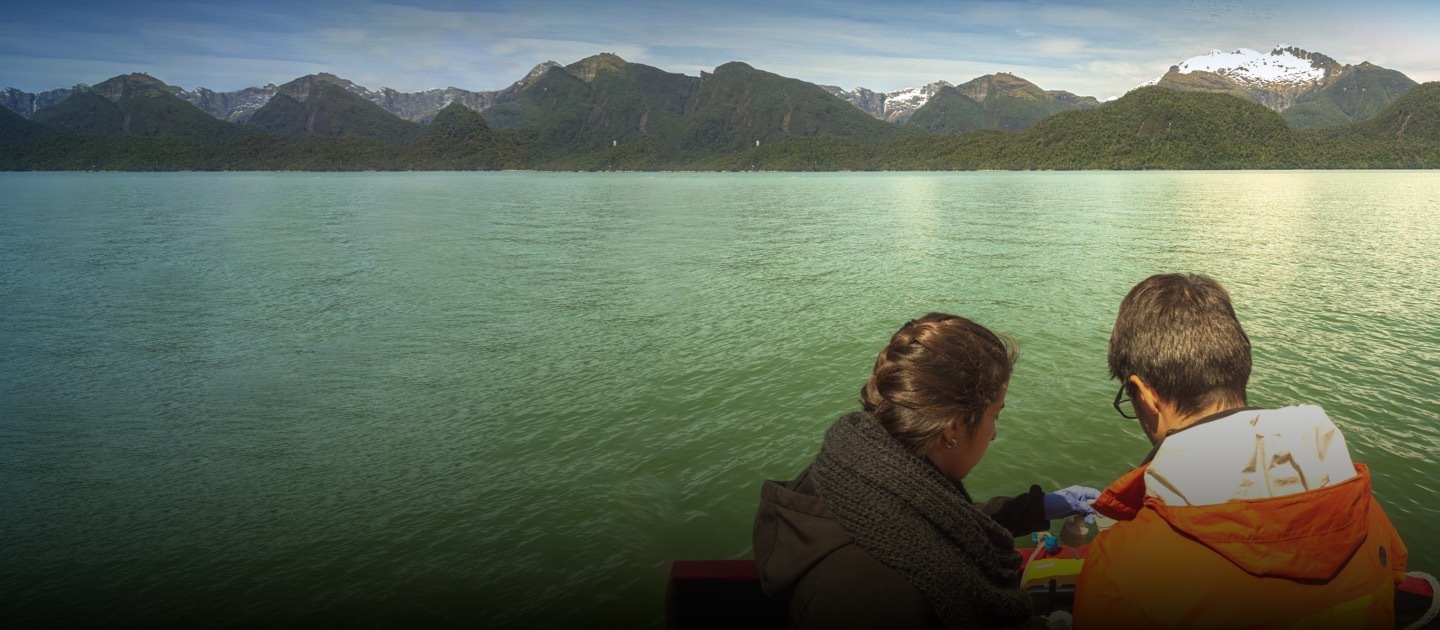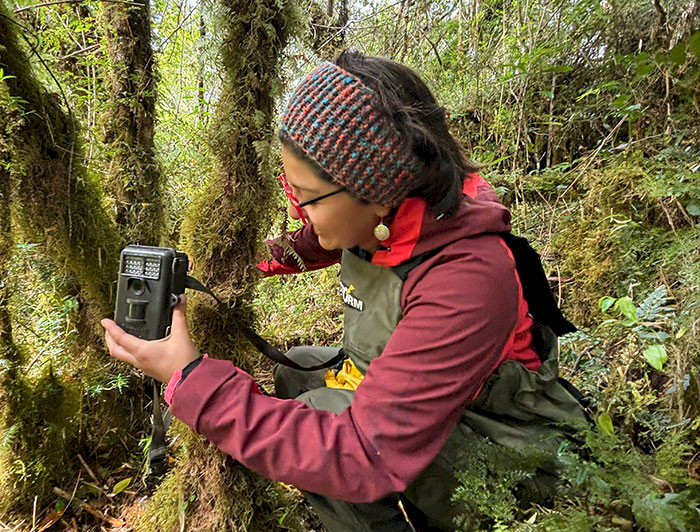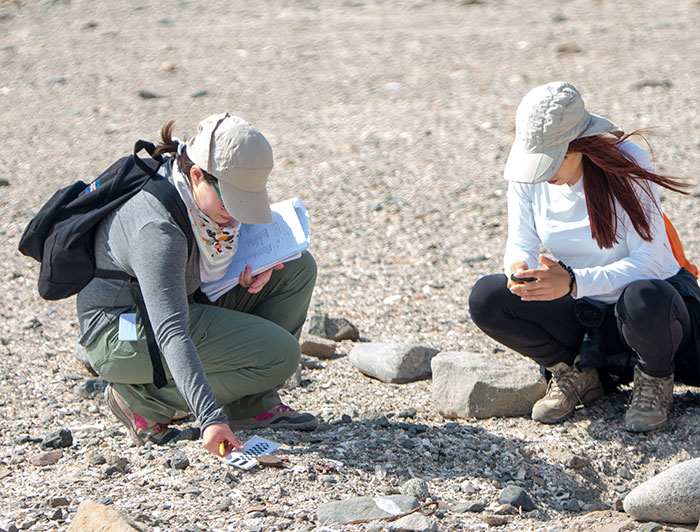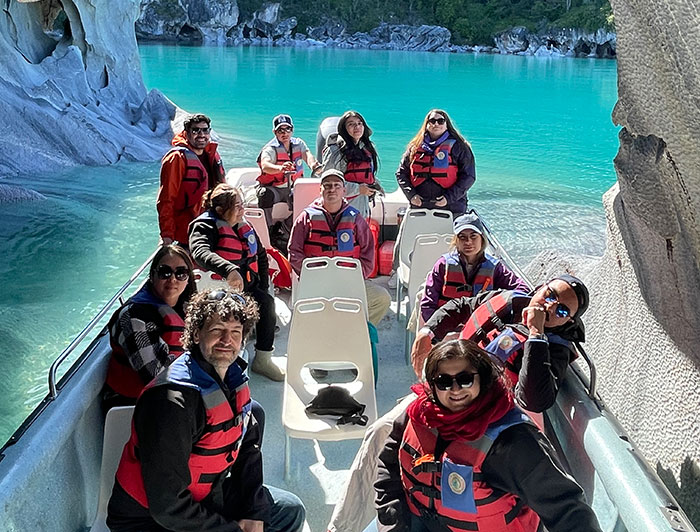
Awakening Scientific Curiosity from Atacama to Patagonia
The UC Chile Network of Research Centers and Field Stations (RCER UC, as per its Spanish acronym) enhances the interdisciplinary work of UC Chile researchers, promoting undergraduate and postgraduate training, through the work in the Chilean territory. This year, it launched an innovative initiative for undergraduates in which they will be able to know and visit the network’s natural laboratories across the country, from north to south.

photo_camera "The aim is to provide students, especially those without field trips in their curriculum or with limited exposure to science, the opportunity to engage in observational learning and field-based science. By participating, they can connect with the university's broader mission of making a meaningful contribution and impact in the regions where the network's stations are located," explained Virginia McRostie, Director of the UC Chile Loa Research Station. (Photo: Sabina Lemunao/ UC Chile Patagonia Station for Interdisciplinary Research)
Chile, a long and narrow country in Latin America, has a varied ecosystem with a long coast that covers almost the entire territory, it also has the driest desert in the world, a wide variety of forests in the south and glaciers that are explored by the UC Chile Network of Research Centers and Field Stations (RCER UC, as per its Spanish Acronym), an initiative that seeks to enhance the work of researchers and students of the university through their interaction with the diverse ecosystems of the country.
The RCER UC has seven stations throughout the country and aims to foster meaningful contributions and impacts in the regions where they are located by leveraging field-based scientific exploration, research endeavors, and community engagement. Following that line, this year it started to hold a new course so that UC Chile students can explore the stations that make up the network.
New Knowledge: From Atacama to Patagonia
On a Friday morning, around 10 a.m. on March 8th, when a serene atmosphere fills the bright College classroom on the San Joaquin Campus, the largest of UC Chile located in Santiago of Chile, Virginia McRostie, a professor of Anthropology and Director of the UC Chile Loa Research Station from the RCER UC, delivers a presentation to a diverse group of students from various majors who listen intently. Is their first class.
Virginia McRostie is leading the coordination of the network's new pilot course for undergraduate students, which began in March of this year. "This course aims to introduce students to the activities of the Network Research Centers and Field Stations. It's open to students from different majors, promoting interdisciplinary engagement. The aim is to provide students, especially those without field trips in their curriculum or with limited exposure to science, the opportunity to engage in observational learning and field-based science. By participating, they can connect with the university's broader mission of making a meaningful contribution and impact in the regions where the network's stations are located," explained the academic.
The new course is titled "RCE1000: From Atacama to Patagonia, Field Perspectives to Understand Changing Socio-Ecosystems." It offers an exploration of the various ecosystems across Chile's landscape. According to Professor McRostie, "Given the remarkable diversity and uniqueness of these ecosystems, the university’s goal and our own as scientists is to address the challenges posed by each territory or region where we work."
The objective is to familiarize students with RCER UC and attract those who may be interested, "so that the network's efforts are more fruitful and sustainable in the long term," she explained.
In the College classroom, José Albornoz, a music major specializing in French horn, diligently takes notes. He is among the 25 students enrolled in the "From Atacama to Patagonia" course. José admits he's always been interested in exploring other regions of Chile beyond the Metropolitan Area. "I see myself contributing at some of the stations. As a musician-in-training, I aspire to perform in different regions of Chile," he shared.
Other students in the classroom also voice their opinions: a psychology student expresses doubts about the field trips, as they are something new for her. Meanwhile, a biological sciences student speaks with visible excitement about her prior experiences on trips like these.
The course draws UC Chile students from diverse academic backgrounds, including Biological Sciences, Social Work, Education, Geography,Law, Anthropology, Psychology, Engineering, Music, and Mathematics, among others. "We aimed to attract students from various disciplines and interests, including those not traditionally associated with fieldwork opportunities. For many, this will be their first exposure to this type of experience, allowing them to learn about the scientific method in real-world settings," explained Virginia McRostie.

Two field trips are scheduled on the course calendar: this semester, students will visit the Coastal Marine Research Station (ECIM UC, as per its Spanish acronym), in Las Cruces, Valparaíso region, were students can study the resources and conservation of the ecosystem of the coastline and the Atacama Desert Research Station, in the north of Chile, in Alto Patache, approximately 65 km south of Iquique, were students will be able to know the fog catchers of the station located in the desert. The trips are planned for May and June, respectively.
Each course unit addresses a different ecosystem where the stations are based, such as Atacama (north), Las Cruces (center), Villarica (south), and Patagonia (south), among others. These modules are taught by the directors of the centers and stations, or by collaborators or researchers from the centers.
The undergraduate course is a way to link students to the network. "If a student encounters something they like during the course, they have the opportunity to potentially pursue an internship at one of the stations or centers, working with a professor on topics of interest. It's just the first step to further engagement", said the director of the UC Chile Loa Research Station.
Sergio Guitart, Field stations coordinator, elaborates on RCER UC's mission and core values, which align with those of the university: education, research, and environmental engagement. “We designed an introductory undergraduate course to provide students with exposure to nature and demonstrate how they can contribute to or find inspiration in field research within their respective disciplines," he explained.
A second aspect involves establishing a trajectory, whereby participants can progress from the course to undergraduate research within the network and eventually pursue involvement in a program or dedicate themselves fully to research within the centers or stations. “It's the first stepping stone," said Sergio Guitart.
One of these locations is the UC Chile Patagonia Station for Interdisciplinary Research, located in one of the most remote areas of the Aysén Region in the south of Chile, in the Exploradores Valley, 220 km south of Coyhaique. Its director, Alejandro Salazar, considers the launch of the general training course to be highly significant. "It offers students from different majors the opportunity to explore the territories and address Chile's current pressing issues, such as climate change and sustainability, from a more practical standpoint. The diverse range of researchers involved in this course also ensures that students gain a comprehensive, yet specialized, understanding of the topics covered in each station."
A Key Role in Education

In simpler terms, RCER UC serves as a backbone for the university, particularly the Office of the Vice President for Research, across the Chilean territory. Stretching from the coastal desert in the north to Magallanes in the south, these "natural laboratories" facilitate cutting-edge research of global and local significance. According to Research Director María Elena Boisier, they provide valuable data sources that pave the way for new research opportunities.
Since its inception, RCER UC has hosted scientists and researchers from both UC Chile and around the globe. Recently, it has also taken on a more prominent role in student education at various levels. At the undergraduate level, it offers opportunities such as the Undergraduate Research Competition (IPRE, as per its Spanish acronym) through the Office of Research. For doctoral students, the network puts out a call for applications through the Graduate Office. Additionally, this year, RCER UC introduced an undergraduate general education course.
“I believe the network offers students numerous opportunities. Through its centers and stations, it provides knowledge and experiences that are hard to replicate in the classroom," said Sabina Lemunao, a UC geographer who participated in the IPRE contest organized by the Office of Research. She highlights that fieldwork "encourages collaboration with professionals from diverse fields and promotes interdisciplinary research, allowing us to understand dynamics from various perspectives."
Over 4,200 students have participated in the IPRE competition since its inception 11 years ago. In 2022, it was officially recognized as a co-curricular activity by the Office of Student Affairs. About a year and a half ago, the competition began offering opportunities for research experiences at RCER UC centers and stations.
For instance, Sabina Lemunao conducted her studies on "analyzing vegetation cover using remote sensing in the Exploradores Valley" in the Aysén region. Although this research primarily involved desk work, utilizing satellite imagery, and visiting the field made it possible for her to validate and compare the information she had gathered.
"The IPRE experience boosted my adaptability as a professional, as fieldwork often requires adjusting methodologies to current conditions - such as working hours and weather. I also honed skills in team coordination and fostering respectful and empathetic work environments," said Sabina, who now serves as the coordinator of the Patagonia Station for Interdisciplinary Research station.
The network's educational impact involves showcasing research spaces within a territory and providing opportunities for students and professionals to explore these topics further. Alejandro Salazar emphasizes the experience of being in a laboratory-like environment, where colleagues offer different perspectives on the same or different topics. "It's about highlighting and appreciating various avenues of university and scientific communication, both within the university and beyond," explains the associate professor from the UC Institute of Geography.
Doctoral Students on Austral Soil

Between December 18 and 22, 2023, a group of UC doctoral students visited the UC Chile Patagonia Station for Interdisciplinary Research in the Aysén region. During their fieldwork, they collected data for their research and gained valuable professional and personal experiences. This opportunity was made possible through a competition organized by the Graduate School to conduct research in various areas within RCER UC.
The December visit marked the second outing resulting from this competition. The inaugural visit took place in 2022 at the UC Chile Center for Local Development (CEDEL UC), located on the Villarica Campus in the Araucanía region, in the south of Chile.
Last December, twelve doctoral students had the opportunity to engage in field research under the guidance of Alejandro Salazar, Claudia Matus (Director of the Center for Educational Justice and professor of the UC Faculty of Education), and Rodrigo de la Iglesia (professor of the Faculty of Biological Sciences). Diego Cosmelli, the Director of the Graduate School and a professor at the School of Psychology, also joined the group.
Ángela Alvarado, a Colombian PhD student in Anthropology at UC Chile, shares, "It was truly amazing. The experience provided invaluable data, insights, and knowledge for my current research as an anthropologist. This is especially significant for me, as my work focuses on the landscapes of southern Chile and the traditional fruits produced in this region."
In the 2023 edition, doctoral students came from various fields, including Engineering Sciences, Biological Sciences, Education, Chemistry, Plant Biotechnology, Engineering and Sciences with Industry, and Anthropology.
Diego Cosmelli highlights that due to its location, the UC Chile Patagonia Station for Interdisciplinary Research enables "cutting-edge doctoral training" and the pursuit of local research projects with global significance. "This competition aims to showcase the opportunities provided by the network, including infrastructure, local engagement, and lines of research, to shape future thesis projects. Ultimately, it integrates a territorial and interdisciplinary perspective into these projects."
According to Vice President for Research Pedro Bouchon: "RCER UC serves as an extensive platform for our university. It is primarily associated with high-impact research tied to the territory and relevant disciplines. However, its potential goes beyond research, as it plays an increasingly important role in educating both undergraduate and graduate students across diverse disciplines. Experiences at RCER UC enhance their training, equipping them with tools that set them apart as professionals and enabling them to collaborate effectively with communities."
In other RCER UC news, the network has recently been working to strengthen its international alliances. "In January, we hosted representatives from the California university system, who visited four of our stations," said network coordinator Sergio Guitart. "During their visit, they met with Research Vice President Pedro Bouchon and explored opportunities for collaboration in teaching and field research."
One specific area of interest is fostering academic and student mobility between the universities. For instance, UC students could participate in courses held in California, particularly within the nature reserve system managed by one of the universities there. An agreement was also signed with British Columbia, "which is a powerful international partner," said Sergio Guitart. Opportunities for scientific and teaching collaboration are being explored with the network.
1) Atacama Desert Research Station: Alto Patache, Tarapacá region.
2) Loa Research Station: mouth of the Loa River, Tarapacá and Antofagasta regions
3) Coastal Marine Research Station (ECIM): Las Cruces, Valparaíso region.
4) Center for Local Development (CEDEL): Villarica, Araucanía region.
5) Senda Darwin Biological Station, partner organization: Chiloé, Los Lagos region.
6) Patagonia Station for Interdisciplinary Research: Exploradores Valley, Aysén region.
7) Center of Excellence of Biomedicine in Magallanes (CEBIMA), partner organization: Punta Arenas, Magallanes and Chilean Antarctica region.


